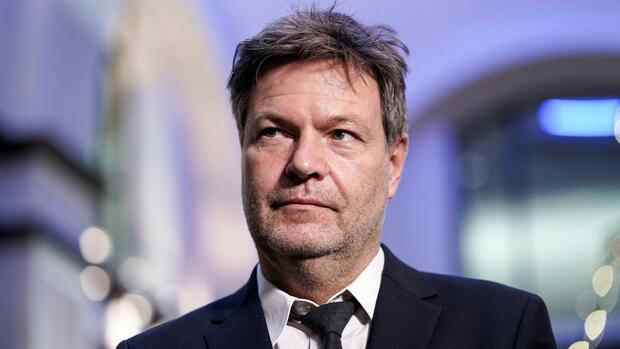The proposals of the EU Commission would water down the good label for sustainability, argues Habeck.
(Photo: imago images / Political-Moments)
Brussels The EU Commission wants to classify investments in gas and nuclear power plants as climate-friendly under certain conditions. This emerges from a draft of a legal act by the Brussels authority, which became public on New Year’s Day shortly after it was sent to the EU member states.
Investments in new batteries should therefore be classified as green if the systems meet the latest technical standards and if a specific plan for the operation of a disposal facility for high-level radioactive waste is presented by 2050 at the latest. Another condition is that the new nuclear facilities receive a building permit by 2045, as can be seen from the text.
Investments in new gas-fired power plants should also be able to be classified as green temporarily under strict conditions. For example, it should be relevant how many greenhouse gases are emitted. For plants that are approved after December 31, 2030, according to the proposal, only up to 100 grams of so-called CO2 equivalents per kilowatt hour of energy would be allowed – calculated over the life cycle.
Federal Minister of Economics Robert Habeck (Greens) has expressed his rejection of the EU Commission’s plan: “The EU Commission’s proposals dilute the good label for sustainability,” Habeck told the German Press Agency in Berlin on Saturday. “From our point of view, it would not have needed this addition to the taxonomy rules. We do not see any approval of the new proposals of the EU Commission, ”said the Minister for Economic Affairs and Climate Protection.
Top jobs of the day
Find the best jobs now and
be notified by email.
Habeck criticized: “Labeling nuclear energy of all things as sustainable is wrong with this high-risk technology.” This obscures the view of the long-term effects of nuclear waste on people and the environment. Hard security criteria are also not provided. “That is more than questionable,” said Habeck. “In any case, it is questionable whether this greenwashing will even find acceptance on the financial market,” he emphasized. The federal government will evaluate the Commission’s draft for its effects.
Robert Habeck wants to encourage investments in hydrogen
Habeck also criticized the proposed inclusion of fossil gas in the so-called taxonomy. “At least the EU Commission makes it very clear here that gas from fossil fuels is only a transition and that it has to be replaced by green hydrogen.”
New gas-fired power plants would have to be geared towards hydrogen now and would be operated with green hydrogen or low-carbon gas from 2035. “That is ambitious and requires large amounts of hydrogen.” One of the major tasks is to encourage appropriate investments in hydrogen. The first corresponding projects are on the track in Germany.
In Germany, three of the last six nuclear power plants were shut down on New Year’s Eve.
(Photo: dpa)
The classification of economic activities by the EU Commission is intended to enable investors to switch their investments to more sustainable technologies and companies and thus make a significant contribution to Europe’s climate neutrality by 2050. However, whether gas and nuclear power should be considered climate-friendly as part of the so-called taxonomy is highly controversial among EU countries.
For example, Germany is against taking up nuclear power, but sees electricity generation from gas as a necessary transition technology towards climate neutrality. For countries like France, on the other hand, nuclear power is a key technology for a carbon-free economy.
The EU member states now have until January 12 to comment on the draft of the legal act sent by the EU Commission late on Friday evening. Implementation can only be prevented if a qualified majority of the member states oppose it. According to this, at least 15 EU countries would have to unite, which represent at least 65 percent of the total population of the EU.
More: Nuclear power, yes please? What France’s nuclear energy offensive means for Germany
